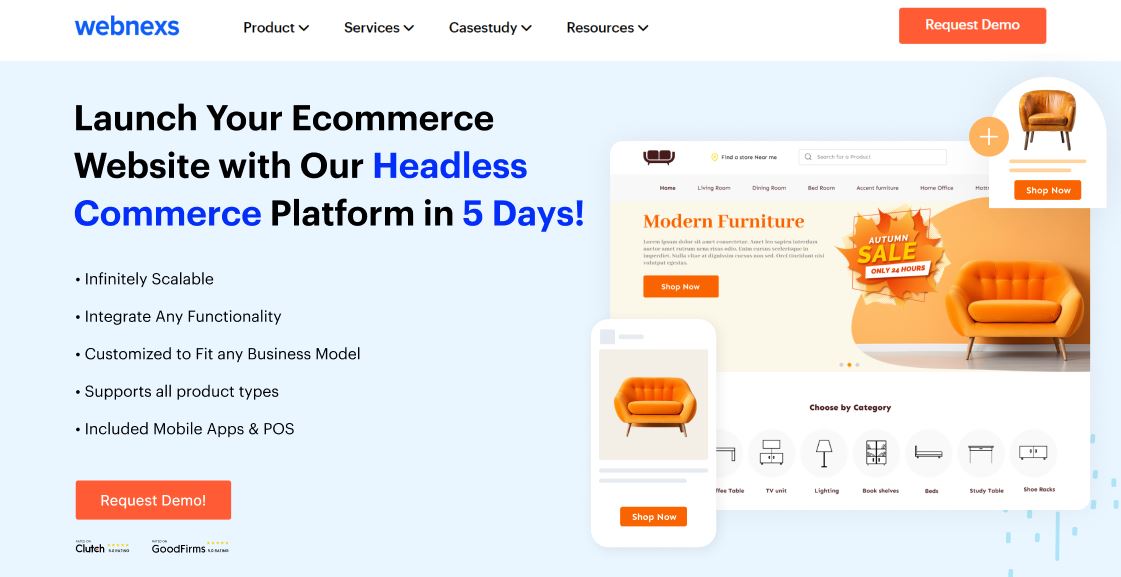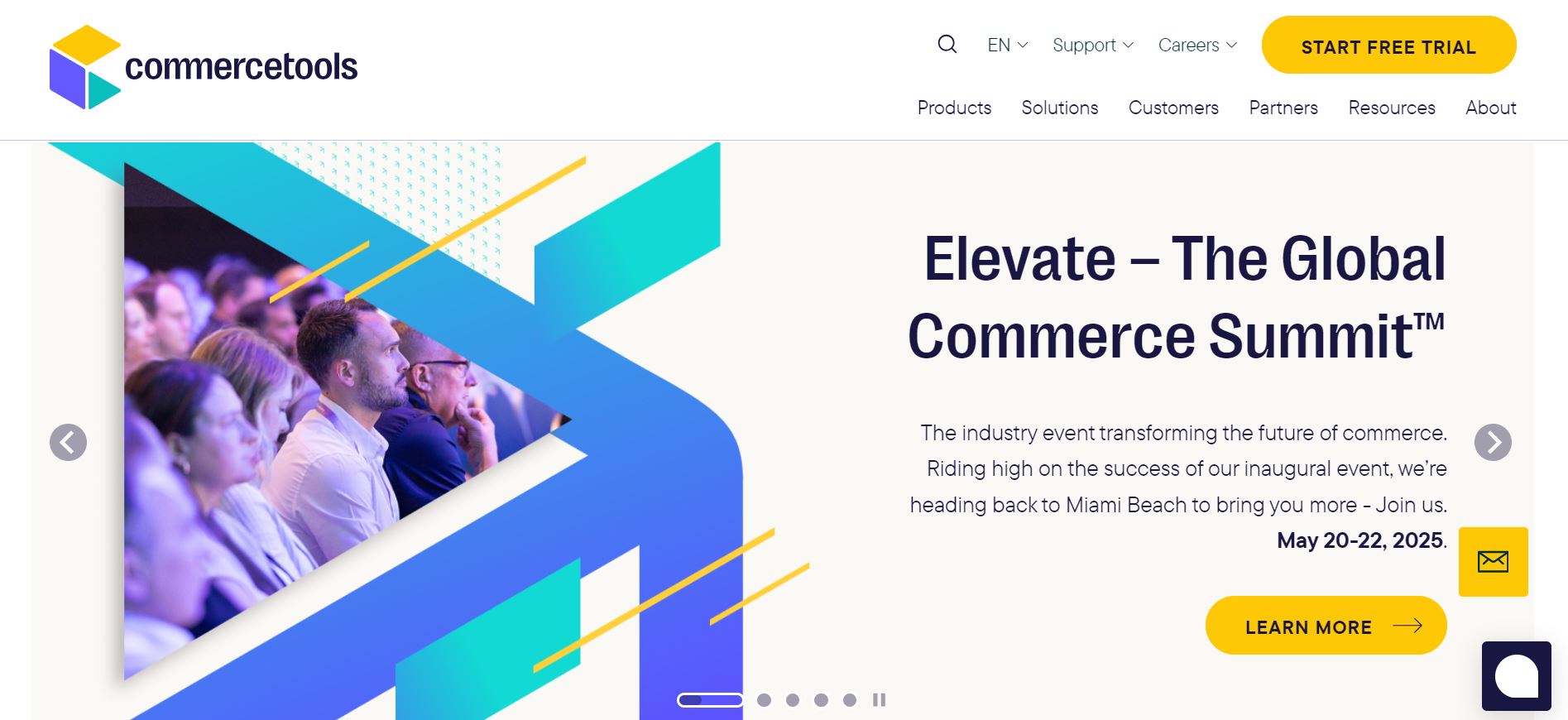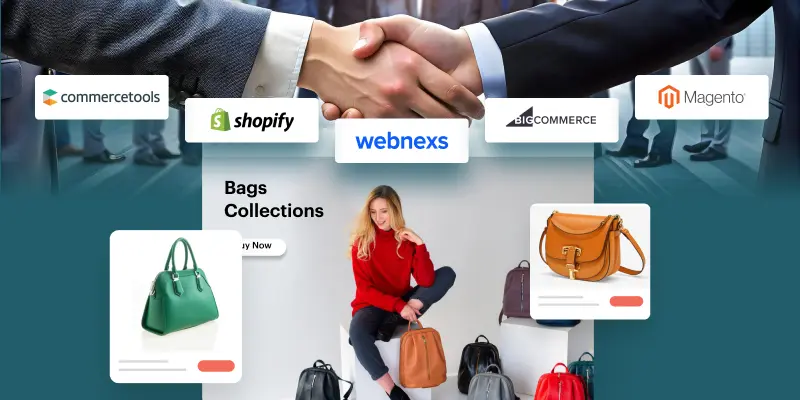By 2025, Both ecommerce platform for B2B, as well as B2C sections, is expected to make up about a quarter (24.5%) of global retail, including both B2B as well as B2C sectors.
With the rise of mobile devices, social media usage, and the Internet of Things, the internet is becoming more personalized. For modern online businesses, it’s important to understand their customer needs and specialize their messages accordingly. That’s where Headless Ecommerce Platforms come in. It’s the future of digital commerce because it offers flexibility and scalability.
If you’re a B2B business owner, staying ahead with the latest technology is vital. That’s why we suggest considering a move to a Headless Ecommerce Platform. This shift can help you provide an excellent experience across all your channels.
This article will explore the top 5 headless ecommerce platforms and how they can benefit your B2B businesses.
What are Headless Ecommerce Platforms?
Headless Ecommerce involves separating a website’s frontend design from its backend ecommerce functionalities. This separation enables greater customization and flexibility. In a Headless Ecommerce Platform, an API connects the frontend and backend systems, enabling smooth communication when customers interact with the online store.
What is Headless Ecommerce Platform For B2B?
Headless commerce platform for B2B represents a type of ecommerce solution customized for B2B companies, offering the flexibility to create and manage online stores independently from a one-size-fits-all legacy system.
In contrast to traditional ecommerce platforms, which rely on a single integrated application, headless ecommerce platform enables B2B ecommerce businesses to separate their website’s frontend and backend. This division enhances website performance, scalability, and adaptability.
Moreover, by adopting an API-driven approach, businesses can select the most suitable technologies to build their stack, ensuring that each component meets their specific requirements.
Replacing integrated ecommerce platforms with decoupled architectures leads to enhanced customer experiences, higher conversion rates, and increased sales for B2B ecommerce enterprises.
5 Key Benefits of Headless Ecommerce Platform for B2B
The world of B2B ecommerce is changing fast, and to stay competitive, businesses must be flexible, efficient, and creative. Headless ecommerce platform for b2b offers 5 key benefits with its separate front-end and back-end structure. Here’s a closer look:
- Customization: With a headless system, businesses can customize the front-end without impacting the back-end. This means tailored interfaces, product catalogs, and workflows to meet specific client needs.
- Agility: Headless ecommerce solutions allow quick adjustments to the front-end, vital in today’s fast-paced digital landscape. New technologies or tools can be integrated without major back-end changes.
- Omnichannel Experience: Back-end becomes a central hub, pushing content to any front-end platform—desktop websites, mobile apps, IoT devices, or in-store kiosks—making B2B ecommerce platform ready for omnichannel experiences.
- Enhanced Performance: Decoupling the front-end from the back-end allows for optimized performance without sacrificing functionality. Faster load times and smoother browsing mean happier customers and higher conversion rates.
- Future-Proofing: Technology evolves rapidly, and headless ecommerce platform for B2B ensures businesses can adapt and integrate new tech to stay relevant and competitive.
Reasons To Use Use Headless Ecommerce Platforms For B2B Businesses?
There are several reasons why business needs to use a headless ecommerce platform for B2B.
First and foremost, it allows you to fully customize the design and functionality of your online store. Unlike traditional platforms, you’re not restricted by pre-set designs, making it easier to customize the front-end while keeping your ecommerce website secure and stable.
Also, headless ecommerce offers greater scalability. You can easily scale your platform by adding or removing features as your business grows, ensuring it evolves with your needs.
Moreover, it’s more adaptable when it comes to integrating third-party applications like ERPs, CRMs, and payment gateways. Using an API-based approach, headless ecommerce facilitates faster, more cost-effective, and simpler integrations.
When is Headless Commerce Platform Right For Your B2B Business?
Determining if your B2B business should adopt a headless approach isn’t set in time. Here are some factors to keep in mind when making your decision:
- A headless system might add unnecessary complexity for startups or early-stage companies with limited products. However, established companies with a well-defined market and understanding of their customers are better suited for headless ecommerce.
- If you have a small product range, the benefits of going headless may not be fully realized. But as your company grows and your product catalog expands, managing updates becomes more challenging, making a headless approach more suitable.
- Launching a headless system requires significant resources upfront, both in terms of time and money. While it may pay off in the long run, the initial investment can be daunting. If the commitment seems overwhelming, sticking with a traditional ecommerce platform may be a better option for now.
3 Key Factors to Consider When Choosing a Headless Ecommerce Platform For B2B
- Flexibility and Customization: Look for platforms that offer extensive customization options to create unique online shopping experiences. Customizable interfaces and personalized experiences can help set your brand apart and increase conversions.
- Scalability and Performance: Ensure the platform can handle increased traffic without slowing down. Scalability and performance are crucial for growth and maintaining a seamless user experience, especially during peak times.
- API Capabilities: Choose a platform with robust API capabilities for smooth integration between frontend and backend systems. APIs enable easy updates and the addition of new features, enhancing flexibility and adaptability.
In addition to these features, consider pricing, support, and compatibility with essential tools like CRM and PIM systems. Prioritizing these factors will help you select a platform that meets your business needs and requirements.
Top 5 Best Headless Ecommerce Platform For B2B Business in 2025
1. Webnexs

Webnexs is the ultimate choice for mid to large enterprises seeking a highly customizable and scalable headless ecommerce platform for B2B. With its open-source architecture and API-first approach, Webnexs offers unparalleled flexibility and customization options to meet the diverse needs of businesses.
But that’s not all! With Webnexs, you can create your own Ecommerce Platform for B2B in just 24 hours and increase your revenue by 5x. Here’s what you get:
- 100% Customizability: Personalize every aspect of your platform to align with your brand identity and business objectives.
- Extensive Feature Set: Choose from over 1000 features to enhance your ecommerce experience and meet customer demands.
- Free Themes: Access a library of 20+ free themes to kickstart your website design.
- API Integrations: Integrate seamlessly with over 100 APIs to extend functionality and streamline operations.
- Flexible Hosting Options: Enjoy the freedom to choose your hosting provider and scale resources as needed.
- SEO-Friendly: Ensure maximum visibility and reach with Webnexs SEO-friendly architecture.
- Advertising Compatibility: Run ads effortlessly on platforms like Google, AdRoll, and Bing to drive traffic and boost sales.
- Exclusive Support: Take advantage of personalized email support to swiftly resolve any questions or issues.
Choose Webnexs and take your ecommerce business to new heights with unmatched flexibility, scalability, and performance. Experience the power of Webnexs and unlock endless possibilities for growth and success in the digital marketplace.
2. Shopify

Shopify Plus, a renowned Ecommerce solution, empowers B2B enterprises with unparalleled creative flexibility and scalability through its headless commerce capability.
Known for its stability and security, Shopify Plus provides businesses with a robust platform and extensive app store, along with complete control over design and functionality. With enterprise-level features and a flexible app-based system, Shopify Plus allows companies to expand their operations according to their unique needs. It enables API-driven experiences by smoothly integrating with platforms such as WordPress, eBay, Google, Stripe, Adobe Experience Manager, Drupal, Mailchimp, Amazon, and others.
Shopify Plus provides a range of valuable advantages, including:
- High Uptime: Offers an average uptime of 99.99%, ensuring stability even during peak traffic periods and high-volume orders.
- Extensive App Store: Provides access to a wide range of apps for customization, allowing businesses to tailor their online stores to their specific requirements.
- Creative Freedom: Grants businesses full creative control to design cutting-edge online shopping experiences that resonate with their target audience.
- Cost and Complexity Reduction: Streamlines operations and minimizes costs and complexities associated with managing an ecommerce platform, enabling businesses to focus on growth and innovation.
3. BigCommerce

BigCommerce provides headless ecommerce platform for b2b businesses with a user-friendly content management system and open APIs, enabling seamless customization of their ecommerce experiences to boost engagement and conversions.
Renowned for its enterprise-level functionality and extensive integrations, BigCommerce boasts an open API architecture. Its intuitive interface and real-time store sales metrics on the Home screen make it easy for merchants to manage their ecommerce store. The side menu facilitates smooth navigation through the backend of the headless commerce site, granting access to core features.
Key offerings of BigCommerce on Headless Ecommerce Platform for B2B include:
- High Uptime: Ensures stability with an average uptime of 99.99%, even during periods of increased traffic and large orders.
- Robust Capabilities: Provides superior performance and a comprehensive app-based system to support diverse business needs.
With these features, BigCommerce stands out as an ideal solution for businesses seeking to create advanced online shopping experiences while simplifying operations and reducing costs.
4. Magento (Adobe Commerce)

Adobe Commerce, previously known as Magento Commerce, stands out as a highly popular open-source Headless Ecommerce Platform for B2B. Widely adopted across various industries, it offers businesses the flexibility to tailor their online stores to suit their specific requirements. Tailored for enterprise and B2B markets, Adobe Commerce is capable of handling high levels of traffic and transactions.
Adobe Commerce provides a variety of essential features for B2B businesses in the online space. Recognizing the unique needs of B2B customers and their distinct sales cycles, the platform provides capabilities for personalized experiences, negotiation of prices, and executing specific transactions.
Here’s why Adobe Commerce is an excellent choice looking to implement headless ecommerce platform for B2B businesses:
- Flexible Front-End Updates: Allows for easy updates to the front-end of the online store without requiring changes to the backend, ensuring seamless customization.
- Multi-Channel Commerce Tools: Offers a comprehensive toolset for multi-channel commerce, enhancing customer engagement rates across various platforms.
- Custom Design Options: Provides the flexibility to create a unique and customized design for the eCommerce website, aligning it with the brand’s identity and objectives.
- Seamless Integration: Facilitates smooth integration with essential business systems like CRM, ERP, POS, PIM, and third-party CMS, streamlining operations and enhancing efficiency.
- PWA Studio: Includes a fully functional PWA Studio, enabling the development of progressive web apps to enhance user experiences and performance.
- Page Builder: Features a user-friendly drag-and-drop Page Builder, allowing for the creation of web pages without requiring technical skills, simplifying the website development process.
Overall, Adobe Commerce emerges as an ideal solution seeking to leverage Headless commerce platform for B2B businesses with it’s online operations.
5. Commercetools

Commercetools is an omnichannel ecommerce platform designed for businesses seeking full control and customization of their infrastructure. With its cutting-edge MACH architecture, Commercetools delivers customizable commerce components, perfectly suited to the unique demands of headless ecommerce platform for B2B operations.
One of the standout features of Commercetools is its Merchant Center, which integrates Product Information Management (PIM) software. This tool aids in the management of product data, orders, and customer information, providing a user-friendly interface for retail operations across all channels.
Noteworthy features of Commercetools as a headless ecommerce platforms for B2B include:
- API-first Approach: Empowers seamless connection between the backend and all frontends, as well as third-party applications, ensuring unparalleled flexibility in operations.
- Flexible and Open APIs: Allows businesses to modify and extend their eCommerce ecosystem to suit their unique needs and preferences.
- Multi-Channel Commerce: Enables ecommerce experiences across various channels, including mobile apps, websites, VR applications, IoT devices, and other tools, catering to diverse customer touchpoints.
- Comprehensive Inventory Management: Offers a complete inventory management solution with tracking, adjustments, multi-store management, and returns processing, ensuring efficient handling of stock across the business.
Conclusion
In conclusion, headless ecommerce platforms for B2B provide businesses with the flexibility, scalability, and customization required to craft unique online shopping experiences that stand out. By grasping the key features and benefits of leading headless ecommerce platforms, companies can make informed choices that match their specific needs and objectives.
Embrace the future of eommerce and leverage the potential of headless commerce platform for b2b to propel growth, enhance customer satisfaction, and achieve lasting success. Among these top 5 Headless Ecommerce Platforms for B2B, Webnexs emerges as the optimal choice for Headless Ecommerce Platform for B2B businesses.




